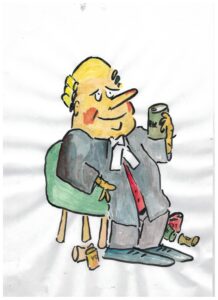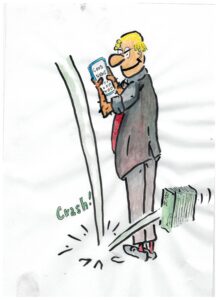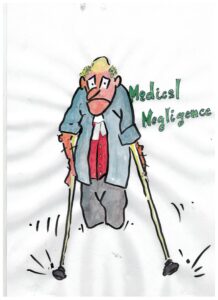res ipsa loquitur?
- 2017-02-19
- By whiggs
- Posted in common law, Medical Negligence, Occupiers negligence, Personal Injury
No thanks I’ve had a glass already.
No really…what does it mean ? OK here’s a brief summary.
The scope and effect of the principle of res ipsa loquitur have been decisively settled by the High Court: Schellenberg v Tunnel Holdings Pty Ltd (2000) 200 CLR 121.
The principle is not a distinct, substantive rule of law, but an application of an inferential reasoning process, and the plaintiff bears the onus of proof of negligence even when the principle is applicable: Schellenberg [at 22].
A plaintiff may rely on res ipsa loquitur even though he or she has also pleaded particular acts or omissions of negligence on the part of the defendant provided the tribunal of fact concludes that:
- there is an absence of explanation of the occurrence that caused the injury;
- the occurrence was of such a kind that it does not ordinarily occur without negligence; and
- the instrument or agency that caused the injury was under the control of the defendant: Schellenberg [at 25].
The principle only applies if it is within the common knowledge and experience of mankind that the occurrence is unlikely to occur without negligence on the part of the party sued. Where the occurrence is outside the experience of the lay person, and the evidence, expert or otherwise, does not establish that such an occurrence ordinarily does not occur without negligence, res ipsa loquitur is inapplicable: Schellenberg [at 41], [at 43].
Lets use an example. Lets say an injury occurred to a person as a result of a collision between that person and another walking in opposite directions down a busy street. Is the collision of such a kind that does not ordinarily occur without negligence? We know that collisions such as this are a regular and common occurrence without negligence. This is thus a positive finding that the occurrence can occur without negligence. Hence, the principle wont apply. This highlights the need for evidence of the circumstances of such collision. It would be a slam dunk for the judge if the tortfeasor wasn’t called to give an account. Be careful of a Jones v Dunkel inference.
Further, it is not sufficient for the facts merely to speak of negligence: the evidence must point to the defendant’s negligence: Schellenberg [at 48].
SEARCH BLOG POSTS
LATEST BLOG POSTS
- Updated product safety mandatory reporting guidance for suppliers now available
- Pleading fraud – cause and effect is essential
- Does the Trustee’s right of indemnity have priority over the right of beneficiaries in relation to assets?
- Rules of war (in a nutshell) | The Laws Of War
- MH370 Final Report
Past Blog Posts
- December 2021
- September 2021
- August 2021
- May 2021
- April 2021
- March 2021
- August 2020
- February 2020
- September 2019
- February 2019
- December 2018
- July 2018
- April 2018
- December 2017
- May 2017
- February 2017
- December 2016
- November 2016
- October 2016
- September 2016
- August 2016
- April 2016
- March 2016
- October 2015
- September 2015
- August 2015
- May 2014
- April 2014
- March 2014
- January 2014
Categories
- Appeals
- Artificial Intelligence
- Aviation law
- Banking and Finance Law
- Blogs
- Civil Liability Act
- Class Actions
- Coding for lawyers
- common law
- Consumer Claims (TPA)
- Contract Law
- Contractual Interpretation
- Criminal law
- Deeds
- Docassemble
- duty of care
- Engineering Law
- Equity
- Evidence
- Exclusion Clauses
- Execution of documents
- Expert Witness
- featured
- Financial Services
- Fraud
- Fundraising (Chapter 6D)
- General comment
- Home Building Law
- Insurance
- Legal drafting
- Local Court
- Medical Negligence
- MH370
- Motor Accidents
- Negligence
- Occupiers negligence
- Other
- Personal Injury
- Personal Property Securities (PPSA)
- Pleading
- Practice & Procedure
- Products Liability
- Property
- Real Property
- Reasons for a decision
- Securitisation
- Security (Mortgages & Charges)
- Sentencing
- Swaps & Derivatives
- Teaching
- Transactional Law
- Transfer of financial assets in transactions
- Trusts & Trustee Law
- Uncategorized
- War and Weaponry
- Witnesses
SEARCH BLOG POSTS
LATEST BLOG POSTS
- Updated product safety mandatory reporting guidance for suppliers now available
- Pleading fraud – cause and effect is essential
- Does the Trustee’s right of indemnity have priority over the right of beneficiaries in relation to assets?
- Rules of war (in a nutshell) | The Laws Of War
- MH370 Final Report
Past Blog Posts
- December 2021
- September 2021
- August 2021
- May 2021
- April 2021
- March 2021
- August 2020
- February 2020
- September 2019
- February 2019
- December 2018
- July 2018
- April 2018
- December 2017
- May 2017
- February 2017
- December 2016
- November 2016
- October 2016
- September 2016
- August 2016
- April 2016
- March 2016
- October 2015
- September 2015
- August 2015
- May 2014
- April 2014
- March 2014
- January 2014
Categories
- Appeals
- Artificial Intelligence
- Aviation law
- Banking and Finance Law
- Blogs
- Civil Liability Act
- Class Actions
- Coding for lawyers
- common law
- Consumer Claims (TPA)
- Contract Law
- Contractual Interpretation
- Criminal law
- Deeds
- Docassemble
- duty of care
- Engineering Law
- Equity
- Evidence
- Exclusion Clauses
- Execution of documents
- Expert Witness
- featured
- Financial Services
- Fraud
- Fundraising (Chapter 6D)
- General comment
- Home Building Law
- Insurance
- Legal drafting
- Local Court
- Medical Negligence
- MH370
- Motor Accidents
- Negligence
- Occupiers negligence
- Other
- Personal Injury
- Personal Property Securities (PPSA)
- Pleading
- Practice & Procedure
- Products Liability
- Property
- Real Property
- Reasons for a decision
- Securitisation
- Security (Mortgages & Charges)
- Sentencing
- Swaps & Derivatives
- Teaching
- Transactional Law
- Transfer of financial assets in transactions
- Trusts & Trustee Law
- Uncategorized
- War and Weaponry
- Witnesses




